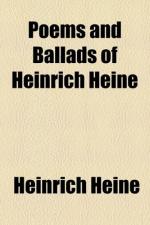|
This section contains 10,211 words (approx. 35 pages at 300 words per page) |

|
SOURCE: "Heine and Utopia," in Heine-Jahrbuch, Vol. 27, 1988, pp. 86-112.
In the following essay, Holub claims that Utopian concerns are not central to Heine's writings, despite claims to the contrary by many contemporary critics of Heine, and that Heine instead expresses a realistic political agenda.
So pflegen immer große Poeten zu verfahren:
sie begründen zugleich etwas Neues, indem sie das Alte
zerstören; sie negieren nie, ohne etwas zu bejahen.
(Heine: Einleitung zu Don Quixote)
It is almost certain that Heine would have protested against the application of the label, "utopian" to his thought or works. For in his day the word had largely pejorative connotations. No longer associated solely with Thomas More's epoch-making work, "utopia" was nonetheless still clearly identified with models of better states or societies. Even by the middle of the eighteenth century, however, the term seems to have been reserved principally for those...
|
This section contains 10,211 words (approx. 35 pages at 300 words per page) |

|


